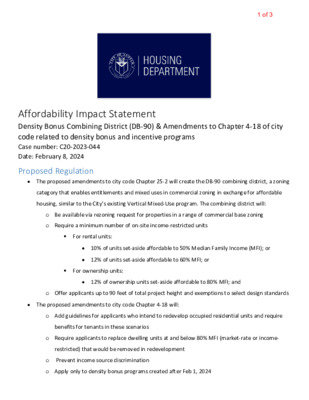18 Affordability Impact Statement.pdf — original pdf
Backup

Affordability Impact Statement Density Bonus Combining District (DB-90) & Amendments to Chapter 4-18 of city code related to density bonus and incentive programs Case number: C20-2023-044 Date: February 8, 2024 Proposed Regulation • The proposed amendments to city code Chapter 25-2 will create the DB-90 combining district, a zoning category that enables entitlements and mixed uses in commercial zoning in exchange for affordable housing, similar to the City’s existing Vertical Mixed-Use program. The combining district will: o Be available via rezoning request for properties in a range of commercial base zoning o Require a minimum number of on-site income-restricted units For rental units: • 10% of units set-aside affordable to 50% Median Family Income (MFI); or • 12% of units set-aside affordable to 60% MFI; or For ownership units: • 12% of ownership units set-aside affordable to 80% MFI; and o Offer applicants up to 90 feet of total project height and exemptions to select design standards • The proposed amendments to city code Chapter 4-18 will: o Add guidelines for applicants who intend to redevelop occupied residential units and require benefits for tenants in these scenarios o Require applicants to replace dwelling units at and below 80% MFI (market-rate or income- restricted) that would be removed in redevelopment Prevent income source discrimination o o Apply only to density bonus programs created after Feb 1, 2024 1 of 3 Land Use/Zoning Impacts on Housing Costs The proposed changes would have a positive impact on housing costs via land use and zoning. The DB-90 program would expand opportunities for mixed use development patterns and housing adjacent to transit, in line with city goals for efficient growth. Impact on Development Cost The proposed changes would have a neutral impact on development costs. There are no direct impacts to development cost anticipated as a result of these amendments. Impact on Affordable Housing The proposed changes would have a positive impact on subsidized affordable housing. This incentive program would create an additional pathway to increasing subsidized affordable rental supply at 50 and 60% MFI and ownership supply at 80% MFI without direct public subsidies. In addition, the City may elect to subsidize additional for-sale and rental residential units in the building. The proposed amendments to Ch 4-18 will ensure that dwelling units created through the city’s incentive programs are more accessible to renters regardless of income source. They will further prevent long-term loss of affordable units through redevelopment, by requiring that participants in qualifying density bonus programs replace affordable units that are redeveloped. 2 of 3 City Policies Implemented These amendments are supported by adopted policy direction in the Austin Strategic Housing Blueprint (Austin’s 10-year affordable housing goals of adding 25,000 units at 31-60% MFI and 15,000 units at 61-80% MFI and the goal to “Protect Renters from Discrimination Based on Source of Income”), the Displacement Mitigation Strategy (Action 3: Incorporate Robust Tenant Protections for All Rental Properties Receiving City Support, and Action 4: Streamline and Expand Density Bonus Programs to Serve Renters at or Below 60% MFI), and the City of Austin’s Fair Housing Action Plan (Fair Housing Goal: Require units with city incentives or subsidies to accept vouchers to be consistent with the recently adopted addition of source of income protection in the City's Fair Housing ordinance). Other Housing Policy Considerations None Manager’s Signature ______________________________________________________________ 3 of 3